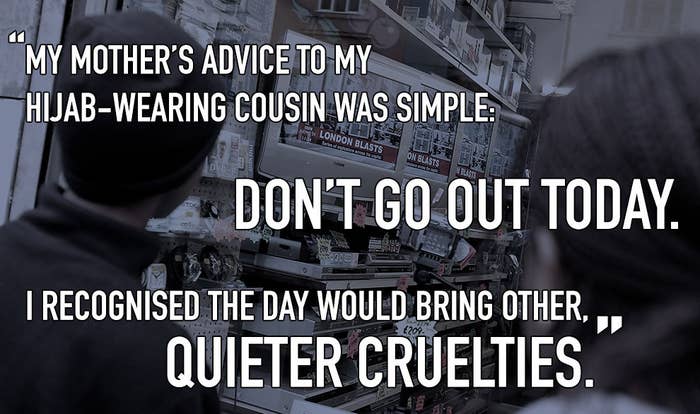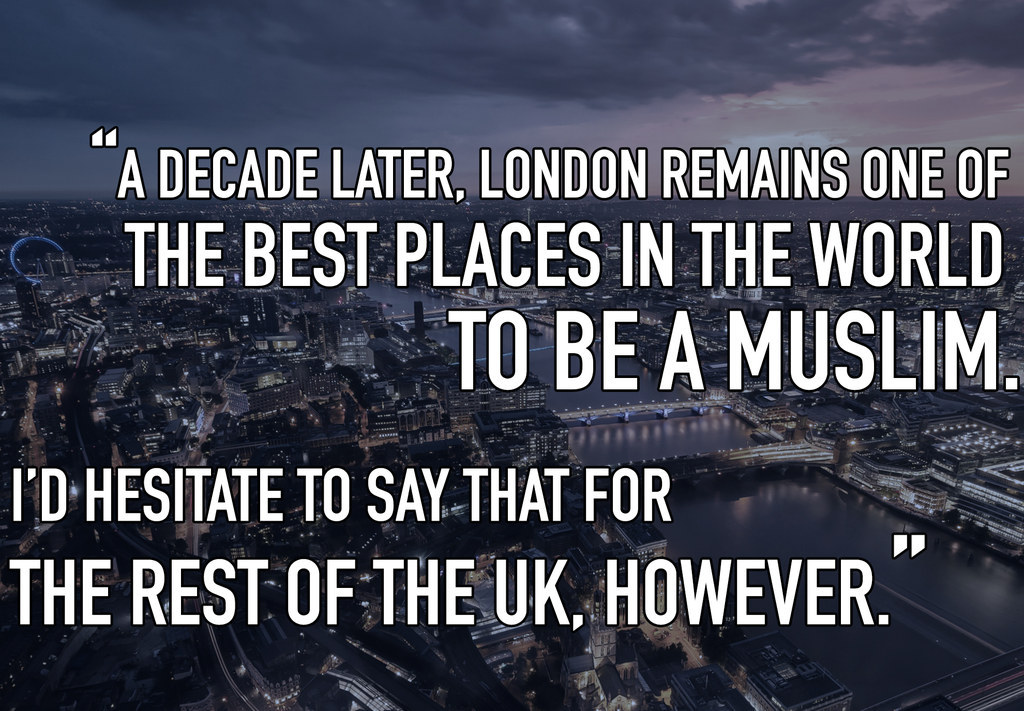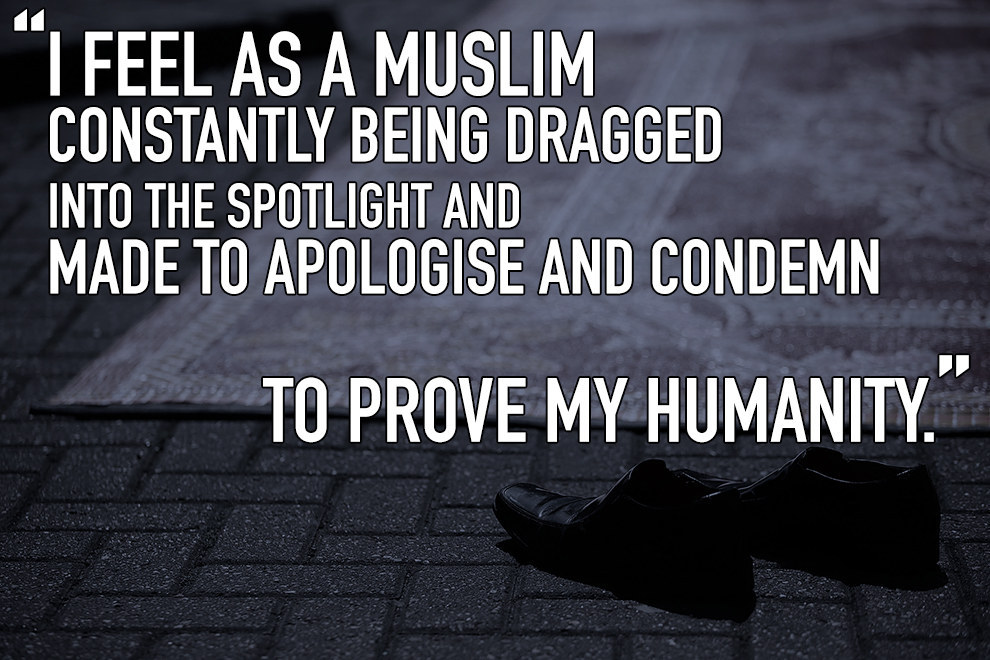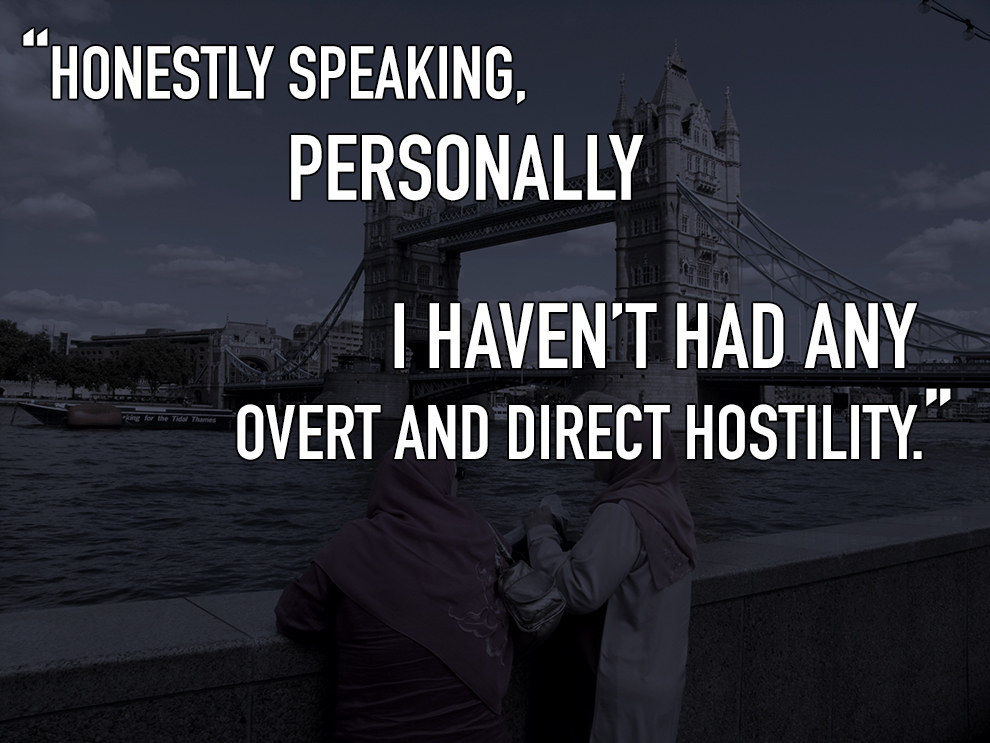1. Momtaza Mehri, 21, Birmingham

I remember asking my mother if our uncles, aunties, cousins were safe. If this summer chaos had found its way into my London; the north London of Kilburn street stalls and the Arabic Teen Titans comics my uncle would buy me from Edgware Road. I won't pretend as if my younger self understood the geopolitics, the inevitable ramifications, but I could see the fear in my mother and that familiar slump of her shoulders. The way a father doesn't ask how your day went, but just stares instead, shaking his head silently. The way stillness enveloped our house. Four years earlier, a hazier memory is dragged forwards; one of frantic Al Jazeera loops, two towers unravelling at the seams, and being shooed away to an early bedtime. I remember hearing my mother on the phone, speaking to her dead sister's daughter. Everyone is safe, she knew that, but her advice to my hijab-wearing cousin was simple: Don't go out today. I was too young to understand this, that July afternoon, but even then I recognised the day would bring other, quieter cruelties. Ten years on and there are still many Muslim communities living in a perpetual state of anxiety. The fault lines under our feet still haven't settled. In many ways, we find ourselves still trying to counter accusations of complicity plastered on front pages or hurled from a minister's mouth. We are still spoken of and spoken for, by everyone from those who have always despised our presence and right to this city to unappointed community 'leaders'. It's easier than ever for young Muslim Londoners to feel as if their existence here is an accident that was never meant to happen. James Baldwin once said he couldn't be a pessimist because he was alive, and it's this I think of when I'm faced with a gnawing alienation and sadness for my peers. Ultimately, I have faith in my local and wider communities and their ability to channel this disenfranchisement into activism, resilience and unity. Imam al-Ghazali reminds us that the period of waiting patiently for release from suffering is an act of worship, an affirmation that young Muslims in London and across the country can create a kinship of faith-based shared experience and catharsis, even in today's climate.
I had just started secondary school when the attacks happened – I didn't actually find out about them until a few hours afterward, and no one really knew what happened. It was only when I got home and saw the news that I realised. My dad was home, and he was just looking at the ground the whole time. I could sense that he was really scared of what would happen next.Life in the UK has gotten a lot better for Muslims, in my opinion. I faced some racist and Islamophobic abuse, but I also found more people being interested in Islam generally. Living in multicultural London, I found people who understood that the attackers weren't like ordinary Muslims. Although there are issues i'm concerned with about the government and media perception of Muslims as terrorists, I think that there are now more Muslims in the media and in politics who can change that. I'm optimistic for the future.
3. Asad Dhunna, 27, London

I was at Warwick University at the time and I remember being slightly bewildered by it all and feeling very detached from it. Years later my daily commute went through Tavistock Square, and I remember looking at the plaque and the sense of detachment remained. I think there's very little by way of a lasting memory in the city – everything seemingly went back to 'normal', on the outside at least. Quick normalisation was put down to the resilience of Londoners and the ability to bounce back, but beneath the surface I did notice a change in some attitudes towards Islam, particularly when it came to Ramadan, when people actually talk about what it means to be Muslim. Whereas before there was intrigue, the mood post-7/7 was more that of trepidation and perhaps even fear about Muslims' motivations. I think it's caused a fracture: Some retreated and hid their faith more, whereas others stood up and reclaimed what it means to believe in Islam. A decade later, I think a vibrant and multicultural city like London has coped well to allow for so many different layers of one identifier, and for that reason it remains one of the best places in the world to be a Muslim. I'd hesitate to say that for the rest of the UK, however.
7/7 was a turning point for every single Muslim in this country. I remember it like it was only yesterday. It was when the bomber jokes began to happen. It was when I noticed my friends sitting away from me in fear because I had a bit of hair on my chin. It was when I began to get taunts about the gym bag I was carrying not containing gym clothes but something else. Life wasn't easy post-7/7 and hasn't gotten any easier ever since for myself or the community. Rather than engaging with the Muslim community, successive British governments since 2005 have chosen a path contributing to the further marginalisation and victimisation of the Muslim community in this country. From the mass securitisation of our public services that has led to Muslims of all ages now being suspect first and citizen second, to the government's security services complicit in the harassment of its own citizens. Life in Britain hasn't got better since 2005. It's only gotten worse. But Muslims are tired of having to repeat the same arguments again and again. After a while some just learn to accept that it's only going to get worse, whilst others are paralysed with fear when it comes to speaking out.
I was living with my parents when the attacks happened – I was 8. Obviously at that age you don't get what's going on; I remember just hearing there were some big fires in London. I realised it was something more when a boy at school came up to me and said he hated me. I remember him saying that it was my dad that did the attacks. Being the only ethnic minority and the only Muslim in my class, I guess I was an easy target. It still made me really upset though.I don't think things have gotten better for Muslims in Britain, if I'm honest. Every week you see a negative story about Muslims in the media, either us being terrorists or stealing benefits. It's worse when you're a Muslim woman, because you're more visible. I know people who've had their hijabs pulled off, been spat at and punched in public because they were Muslim. A good friend of mine was chased down her street by a group of boys a year ago, calling her 'scum' and other, racist terms. The government haven't done much to help either. Now I hear Theresa May is bringing in new laws to monitor Muslims, and Cameron said Muslims are 'quietly agreeing' with groups like ISIS, which is totally, totally wrong. But he said that and hasn't been challenged by anyone. It makes people think they have a right to abuse Muslims.
6. Rabbil Sikdar, 20, London

I was 10 when 7/7 happened. My brother picked me up from school, and when we got home we saw it all on TV. I remember my aunt phoning from the city and saying she was safe because she used the tube that morning. I never knew it then but for British Muslims, a terrorist attack also means a backlash; it means Muslim children bullied in schools, vandalised mosques, street attacks, shunning Muslim workers, government and media coming out together and making us feel like the inside enemy, the fifth column.I feel as a Muslim constantly being dragged into the spotlight and made to apologise and condemn to prove my humanity. Patriotism today translates for bigotry. Wherever I go, I always wonder if everyone is now suddenly a UKIP-er. Being British for me once meant loving Wimbledon, the NHS, pointlessly supporting England, but today being British seems to be this thing separate to me; it's waved in front of my face as supposedly everything I am not.
I remember listening to BBC Radio Five Live, and the jovial coverage of London's public transport chaos slowly morphing, as more information came in. I vividly recall that sinking feeling.During the fallout, three reactions competed to overwhelm me: disgust at what'd been done (and supposedly in my name), anger that I was being made to feel guilty, and, above all, paralysis: feeling unable to express any thought on the subject with honesty.That same paralysis has been evident in so much Muslim commentary since that time: Between bleating cod-apologies and openly declaring war on one's neighbour, there continues to be little space in mainstream discourse for nuance.For all the surround-sound coverage, majority Britain still does not understand, 'Why are they so angry?' It feeds the idea that the wellspring for terrorism is Islam itself. And Islam alone. Conversely, the axis of British Islam is shifting towards something that our grandparents would find unrecognisable. Forget lamenting the disconnect – more and more British Muslims welcome it. Personally, this has meant my drifting apart from both constituencies. Entropy.
There have been issues growing since the attack on the twin towers in 2001, whereas the 7/7 bombings just added fuel to the already large fire. It amplified the rush of Islamophobia in UK, with the increased anti-muslim sentiment and the extremist groups. I'm not surprised if life for a Muslim is much more difficult now compared to back then. Of course we live in a diverse and multicultural society which is much more open-minded than before and a capital that is bursting with people from various backgrounds, cultures, races; however, it isn't as open to religion as you would expect it to be.Currently Britons are more fearful and aware of ISIS and ISIL as they feel these groups pose a far greater threat than al-Qaeda. Incidents such as these are executed by a small minority of alleged 'Muslims' that decide to take drastic action in committing unacceptable acts in the name of Islam and the Qur'an against the innocent.Why is it that when a Muslim kills people, all other Muslims are told we must be responsible, condemn, apologise and explain on their behalf ? Why should we, if we never committed that crime or knew that person ? Muslims don't ask other people from other religions to condemn their people when they attack others, so why are Muslims being forced to do the same while everyone else is silent? This needs to be tackled – there needs to be more education and empathy around the topics, a widespread community cohesion, and wider participation with communities and better integration of cultures and religions.
9. Shahzad Younas, 31, London

Honestly speaking, personally I haven't had any overt and direct hostility. For sure, at work I experienced more questions about Islam and the possible logic or reasoning behind the attacks. Non Muslims were a lot more inquisitive about what 'Muslims' had to say about all this. Generally speaking, however, I must admit that people have still remained as close, welcoming, and warm to myself.I don't think things have improved for Muslims in Britain. Sadly the almost constant demonisation of Muslims is having an effect on relations. I do sense an increased mistrust of Muslims. It is almost relentless – those who don't interact with Muslims often automatically have a very negative feeling towards Muslims. It is very sad to see; however, all things are relative and the general multicultural melting pot of London mostly ensures that Muslims are fairly understood and respected. However in other parts of the UK I don't think it's always the case.
I was at school in London when the attacks happened. All I remember was that it was a really scary time, and when I heard news of the explosions, I just prayed it wasn't an attack carried out by a Muslim. Anti-Muslim attacks were not uncommon in the UK before 7/7, and I know that many of my Muslim friends had been verbally or physically abused because of 9/11. 7/7 made things much worse for me in the short term. Because I wear the hijab I remember getting a lot of dirty looks when I took the bus to school. I was called a terrorist and the 'wife of Bin Laden' at a shopping mall, when I was with my mum. That was a really bad time because I remember my mum trying not to cry in public. Nowadays, things are better and worse. Better because I think more people are willing to understand the difference between ordinary Muslims in the UK and people who do these things in the name of Islam. But worse, because the fear of Muslims has risen, especially as a result of ISIS. And with all these British people going to supposedly join them, the negative perceptions of Muslims and Islam that we had immediately after 7/7 is starting to come back. In my opinion, that will only make Muslims feel more alienated.
